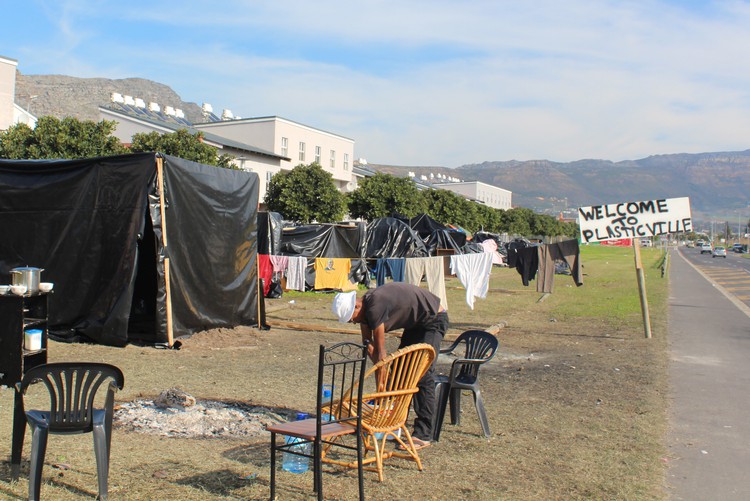
After being evicted from Steenvilla, families set up tents on the grass embankment along Military Road and called their settlement Plasticville. Photo: Thembela Ntongana
25 July 2018
On Wednesday morning the City of Cape Town’s law enforcement removed the former Steenvilla residents who were living outside the complex on Military Road. This, at least for now, brings to a close a long-running battle that had engulfed the largest social housing project in Cape Town.
On 6 June about 30 households were evicted from Steenvilla. They had not made their rent payments, in some cases for well over a year. About 15 of these families then set up tents on the grass embankment alongside Military Road outside the complex. They named their mini-settlement Plasticville. SOHCO, the non-profit company that manages Steenvilla, hired additional security to guard Steenvilla as tensions rose between the evictees and the residents. Several times in the past month and a half the evictees have protested by burning barricades on Military Road.
Steenvilla has over 700 units. The units are subsidised by the state, allowing SOHCO to charge rents that are below market rates. In 2017 rents at Steenvilla ranged from R1,000 to R3,150 per month.
On Wednesday morning reports came in of police taking action against Plasticville. By 8:30am, when GroundUp visited the area, there was no sign of the makeshift tents, although there was still a large law enforcement presence and activity outside Steenvilla.
Richard Bosman of the City’s Safety and Security Department confirmed that action had been taken. “We removed goods left on the road reserve after we had requested that it be removed.”
“The City laid a trespassing charge with the South African Police Service following the erection of structures on the pavement outside the Steenvilla complex in Military Road, Steenberg,” Bosman said. “Law Enforcement also served notices to the group on 9 July 2018 in terms of the by-law relating to Streets, Public Places and Prevention of Noise Nuisances, but these were disregarded. A joint operation therefore followed early this morning, where SAPS was the lead agency in terms of the trespassing charge that had been laid.”
Beryl Schouw, chairperson of the Steenvilla Action Group as well as a tenant of the complex, who is concerned that she may be evicted, said that law enforcement came at about 4am and “evicted” people who were camping outside Steenvilla. She accused them of failing to produce a court order.
“Small children were left in the cold. Their furniture got more damaged than before. They said they are taking their furniture to Khayelitsha and refused people a chance to take some change of clothes. Some people were left wearing pyjamas. All their stuff is gone,” said Schouw.
But Bosman said the “15 structures were found to be unoccupied”. He said all furniture and goods found were taken to the City’s pound in Ndabeni “for safekeeping”.
Two stun grenades were fired by SAPS to disperse people. Bosman said that no injuries were reported and no arrests were made.
GroundUp asked if accommodation had been provided to the people living along Military Road, but no answer was given.
The dispute between the City and the “Plasticville” residents as to whether this morning’s action constituted an eviction may yet go to court. But for now the battle over evictions at Steenvilla appears to have at least moved away from the property itself.
We have written in support of state-subsidised rental housing. While not a panacea to the country’s housing crisis, this kind of housing done properly can often — not always — accommodate many more people in better conditions and more affordably than ownership-based RDP houses.
State-subsidised rentals need to be scaled up. Steenvilla is potentially a model of how it can be done.
But at the same time the fraught evictions at Steenvilla have highlighted the downside of state-subsidised rentals: there will always come a time when some families can no longer afford to pay the rent. Without rent being paid, state-subsidised rental complexes like Steenvilla would become unmaintained and degrade into slums.
It is terrible that families had to be evicted from Steenvilla. Many of these families have likely ended up living in tin shacks in the backyards of other people’s homes, with no easy access to toilets, water or electricity. But SOHCO has no reasonable choice other than to proceed with evictions when rents do not get paid, or else the social housing model will fall apart. There are no easy solutions to this quandary.
Nevertheless, it’s fair to ask whether the City of Cape Town is doing enough to accommodate evictees. But currently the resources available for housing are far less than demand. A decade of mass corruption under the Zuma administration has left this disparity even greater.
The evictees have had a torrid enough time so it is with some reluctance we point out a serious strategic error they made. Faced with eviction they aligned themselves with Gayton McKenzie, a convicted gangster who runs a dubious political party called the Patriotic Front.
McKenzie, who appears to have been motivated primarily by seeking publicity from the conflict, covered some legal costs of the residents and perhaps helped stave off their evictions for a while, but the inevitable came. Had the evictees aligned themselves with a group like Reclaim the City, a more principled approach would have been taken and a better outcome for them may have been achieved.
This story and others we have published on the urban land problem have shown (see our stories on Brakpan, for example) there are venal politicians who are making untenable promises or worsening bad situations (e.g. with the EFF’s land registration scheme in Brakpan). The victims of this are invariably the most vulnerable people themselves, those without formal homes.